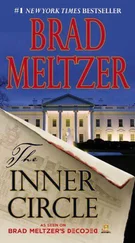“Yes.”
“And that it will have to be infinitely more complex?”
I said nothing, thinking of the work it would entail, the waste of his irretrievable time, my own idle curiosity and how I’d set back the project before I’d even had a chance to contribute to it. I was angry with myself. And ashamed.
Prok got up, crossed to the mantel and spent a moment rearranging the framed photos there. I studied him from the rear, the long tapering range of him, the narrowed shoulders, the bristle of hair. He went next to the window, peered out into the darkness, then came back across the room and settled on the sofa before reaching up to flick off the lamp. Shadows stole out to enclose the room, the only light emanating from a lamp in the hallway. “So,” he said finally, “you know my history, then? But here”—patting the place beside him on the sofa—“come here and sit.”
I obeyed. I got up from the chair and eased in beside him on the sofa.
He put his arm round my shoulder then and drew me to him so that our faces were no more than six inches apart. “You shouldn’t have pried, John,” he whispered. “Shouldn’t have. But I tell you one thing, it was good of you to confess.”
“I’m sorry,” I said.
“Demonstrates character. You realize that, don’t you?” He gave my shoulder a fraternal squeeze. “You’re a fine young man, John, and I appreciate your candor, I do.”
And then something strange happened, the last thing I would have expected under the circumstances — he kissed me. Leaned in, closed his eyes and kissed me. Some period of time passed during which neither of us spoke, then he took me by the hand and led me up the stairs to the spare room in the attic, and I remember a Ping-Pong table there, children’s things, a fishing rod, an old sewing machine — and a bed. I didn’t go home that night, not until very late.
Iris was taking a Shakespeare course that semester in the same building where I was sitting in on Professor Ellis’s Modern British Poetry. I didn’t realize it at the time because I hadn’t yet got around to contacting her, though I’d meant to, so it was something of a surprise to run into her in the corridor one afternoon. As I remember it, the day was dismal, hanging like lint in the windows, the linoleum slick with wet, the whole world giving off a reek of mold and ferment. Rain had fallen steadily for the past week and there was more in the forecast. I was thinking nothing, umbrella, notebook and poetry text tucked under one arm, dripping hat in the other, making my desultory way through the mob of students in the corridor. Perhaps I was dreaming. Perhaps that was it.
She was on me before I could prepare myself, right there in front of me, two sets of shoulders parting, a girl in a yellow mackintosh grinning and ducking out of the way, somebody calling out something. Iris. There she was. We both pulled up short. “Hi,” she said, and her smile was an education in itself.
“Yes,” I said, “hi.”
Her eyes seemed to drain all the available light out of the corridor, and there was nothing I could do but stare into them, fascinated. She seemed to have done something to her hair too, or maybe it was just wet. What was she wearing? A sweater six sizes too big for her, woolen skirt, ankle socks, saddle shoes. “You have Ellis this period?”
“Modern British,” I said. “Poetry, that is. But listen, I never — did you get my note?”
She gave me a quizzical look.
“You know, that day — when we were supposed to go to the play? I left the tickets, and you know, a note, with the girl at the desk. The RA. I just wondered if you, well, if you got them.”
Two streams of students were making their way round us as we stood there like posts in the dank hallway. There was a buzz of talk, I saw Professor Ellis at the far end of the corridor, a hundred pairs of shoes squealed on the wet linoleum. “Please, John,” she said, her mouth drawn down to nothing, a slash, a telltale crack in the porcelain shell of her shining, martyred face, “not here. This isn’t the place.”
I just stared at her, mortified. An overwhelming sense of guilt and loss, of a doomed and inextricable culpability, began to drum at the taut skin of me, and, yes, the back of my neck went cold and the hair prickled on my scalp. “At least hear me out,” I said.
“You want to talk? All right. Fine. I’d be interested to hear what you have to say, I really would.” Her face was bled of color now, and she held herself absolutely rigid. “Four o’clock,” she said, her voice struggling for the right tone, “at Webster’s. You can’t miss me. I’ll be the girl at the back table, sitting all by herself.”
I had to ask Prok to shift my hours that day, and I can’t say that he was overjoyed about it — anything that interfered with work was antithetical to his project, and so, by extension, to him — but I managed to get to Webster’s Drugstore before she did, and when she came through the door in her rain hat and made a show of shaking out her umbrella and throwing back her hair to mask whatever she was feeling, I was there. I told her I was glad she could come and then I told her how much I liked her and how sorry I was for what had happened, and my explanation probably ran to several paragraphs, but suffice it to say that I did adduce Prok and the importance of cultivating him for the sake of my job and future prospects.
She listened dispassionately, let me go deeper and deeper until at some arbitrary point her face lit with a smile and she said, “I took a friend. To the play, I mean. And it was one of the most enjoyable things I’ve done since I got here freshman year.”
“Oh,” I said, “well, I, in that case—”
“Don’t you want to ask his name?”
We were drinking tea and fighting the impulse to dunk our powdered donuts into the little ceramic cups set out on the saucers in front of us. I didn’t drink tea. I didn’t particularly like tea. But I was drinking tea because that was what she had ordered with a look at the waitress — and then at me — that made tea seem exotic, the ultimate choice of those in the know. I’d just raised the cup to my lips, and now I put it down again. I tried to be casual. “ His name?” I said. “Why, do I know him?”
She shook her head, her hair catching the light through the window. “I don’t think so. He’s a senior, though. In architecture. Bob Hickenlooper?”
What can I say? Hickenlooper’s face rose up before me, a conventionally handsome face, the face of one of the most popular men on campus, one who had a reputation for chasing anything that tottered by on a pair of heels — or in flats, for that matter — and he was a brain too, with a great and staggering future ahead of him. Jealousy seized me. My hair — the loop of it that never seemed to want to stay where it belonged — fell across my forehead and I had an impulse to reach up and tear it out of my scalp with a single furious jerk. “He’s — he lives in my rooming house,” I said, making my voice as cold and small as I could.
She was enjoying herself now — that much was evident from the glint in her eyes and the way she shifted in her seat to get a better look at me. I watched her lower her head and purse her lips for a long slow sip of tea. “But enough of me,” she said, “what about you? I hear you’ve been promoted.”
“Yes, I—”
“Sex research, right?”
I nodded, a hundred thoughts warring in my brain, not the least of which was how she would have known: Through Hickenlooper? Paul? Her mother? But how could her mother know if mine didn’t? I wanted to change the subject, wanted to ask her out to the pictures for Saturday night, right then and there — and I did, but not before she said, “How did ever you get that ?”
Читать дальше












